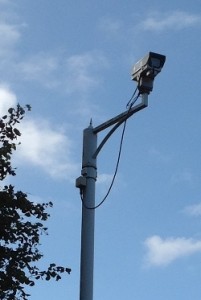We rely upon surveillance in so many ways. It makes our airports, railway stations and car parks a little safer – but perhaps more significantly (and misleadingly) we feel safe because we know that monitoring is underway. We practice surveillance ourselves although tending not to name it in those terms. For example, we might feel our lives diminished if our social networking accounts closed and we could no longer monitor our friends and relay to them our status.
We are subject to surveillance far more than we think. The convenience of online shopping is available to us as a result of continual monitoring and analysis of the products we view, buy or sometimes suggest in our wish list. Anyone working in a telephone call centre is familiar with the close observation of their productivity – or at least the rate at which they are able to field customers’ queries.
 Teachers across the education sectors know all too well what bureaucratic monitoring of achievement looks like and, significantly, how that auditing system moulds the responses of teachers, students and educational administrators alike.
Teachers across the education sectors know all too well what bureaucratic monitoring of achievement looks like and, significantly, how that auditing system moulds the responses of teachers, students and educational administrators alike.
Most of us are probably appreciative of computer infrastructures to fight and detect crime. Were the police to return to filing carbon-copy reports stored in battered cabinets at a local station instead of being able to call up detailed information it would cause us considerable consternation the next time our home is burgled or our car vandalized in our drive-way.
We are beneficiaries, objects and practitioners of ubiquitous surveillance. At the same time, we can be quite adept at managing how visible we need be to those seeking to scrape valuable information from the data trails we leave behind when we surf the internet, use mobile phones or drive through urban areas. We are not just passive people caught in the gaze of governments or multinational corporations. We do resist – perhaps by keeping hoods up when we’re aware of CCTV cameras or by videoing police activity on our phones when we’re making lawful protests. Some of us give bogus details to online enquiry forms that are just wanting customer information. Illegal and immoral avoidance of surveillance is, of course, also a feature of our complex societies.
In my work on surveillance I intend to help raise the public’s awareness of not only the widespread and diffuse forms of surveillance but to open up some critical discussions about what constitutes good, bad or indifferent practices. I believe that one of the vital aspects of being fully human is recognizing what is being done to us in order that we might better resist and/or support efforts purportedly being made on our behalf. I am not against surveillance per se but have serious questions about the way deploying surveillance seems to be the ready response to any or all social, security, administrative challenge.
I write as a Christian theologian and so from a quite particular standpoint. However, I believe that it is only from the richness of our respective contexts that we can possibly say much that is useful. Those who do not share my religious outlook (either because they are of another faith tradition or none) might find that my observations ring bells for them. Interacting with one another’s viewpoints in a spiral of listening and speaking refines and builds criticism (and support) of surveillance policies that are relevant well beyond the limited confines of my particular theological standpoint. My aim as a Christian theologian is not to tell you, the public, what you should believe or do, but to encourage you to ask the best questions about what is being done to you – and in what we are all, as citizens, more complicit than might immediately be obvious.